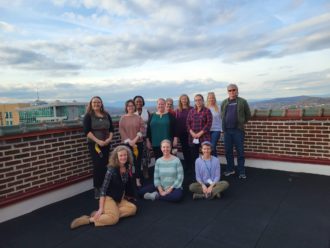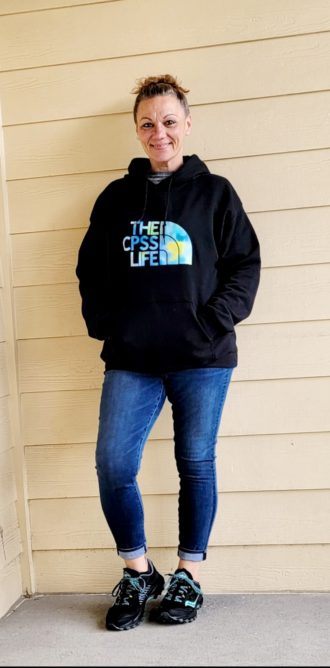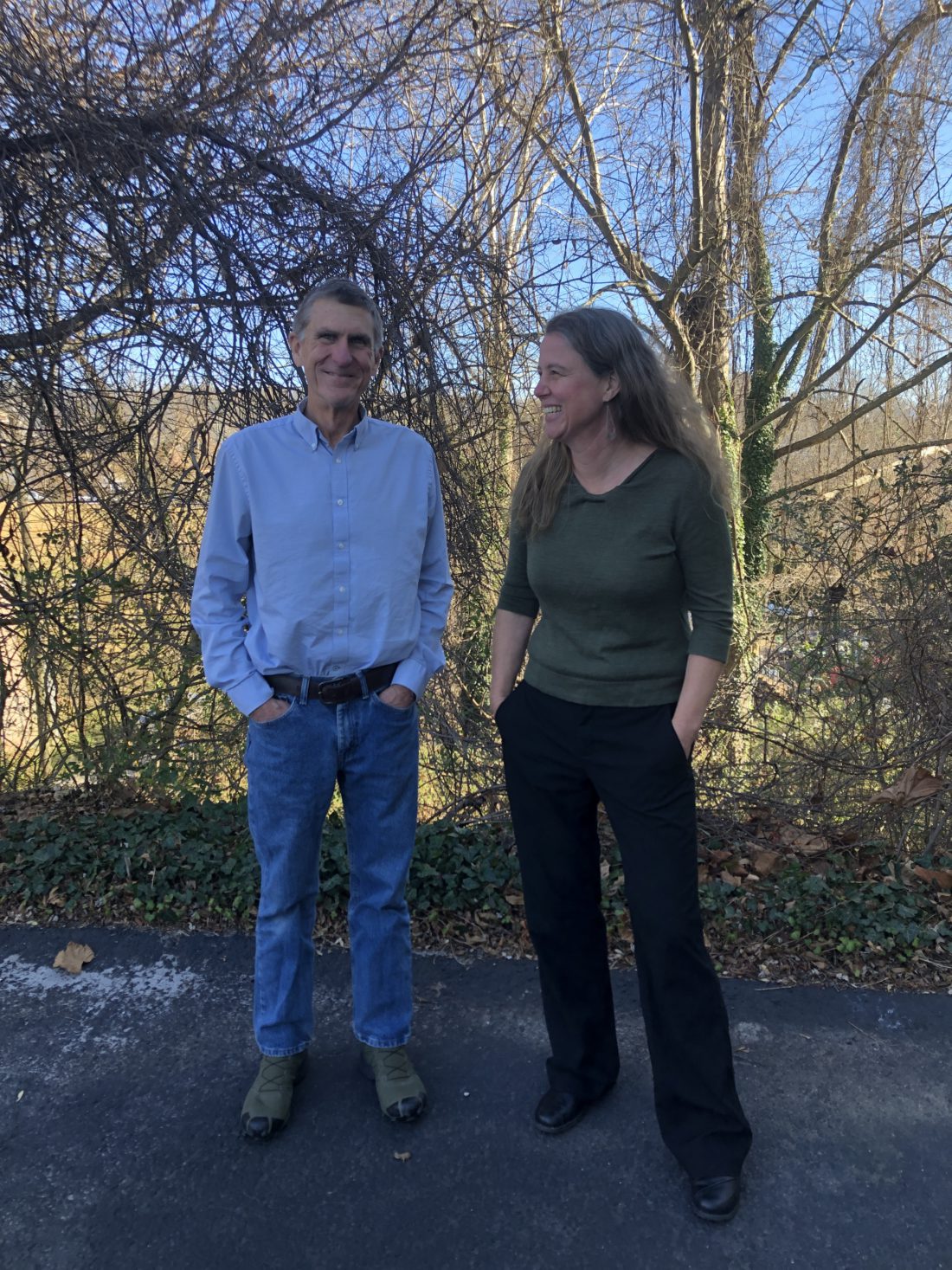“Nonprofits are a labor of love,” says Molly Nicholie, executive director of the Appalachian Sustainable Agriculture Project. She has been with ASAP for 17 years, starting just after college as an assistant with the Growing Minds Farm to School program and working her way through the ranks. After a year as co-director with Charlie Jackson, the nonprofit’s founder, Nicholie became full-time executive director at the start of 2022.
“[Jackson] was very strategic in thinking about his path to retirement and wanting to set up the organization for success,” says Nicholie. “Leadership transition is a huge challenge for any organization and nonprofit. You want to be able to work closely and deliberately on the transition over a period of time.”
Over the past several years, due in part to community changes resulting from the COVID-19 pandemic, many local nonprofits have been thrust into hiring leadership positions. Most have not had the liberty of hiring qualified candidates from within and have had to conduct broader searches.
Cindy McMahon, interim executive director for Homeward Bound of Western North Carolina, says the most important lesson she learned from a recent hiring decision was not to rush the process.
“It’s always, in my experience, more important to take the time to get the right person rather than leaping and then regretting it,” McMahon says. For Homeward Bound, that right person was Marcus Laws, recently hired as the organization’s director of homeless services after a three-month search and interview process.
Beyond local
Laws, who previously lived in Asheville, came to the position from West Palm Beach, Fla. He is one of several local nonprofit leaders to transition recently to the area from out of state. McMahon explains that although Homeward Bound likes to hire locally when possible, the position was advertised on the national online platforms WizeHire and LinkedIn to attract outside candidates.
“There’s a limited pool of folks in the area who are looking for these jobs, so casting a wide net gets more applicants,” says McMahon.
A national search for a leadership position for a well-known nonprofit might get 150-200 applications, while a local search will turn up only about 10-30, estimates Gary Landwirth. He’s the founder and principal of Giving Ideas, a consultancy that helps WNC nonprofits build sustainable leadership.
The number of qualified candidates, Landwirth continues, usually makes up only a small percentage of the total applicants. An initial pool of 150 might yield only 10-15 qualified candidates, he says.
Although Laws was discovered through a national search, his previous ties to Asheville made him a strong candidate, says McMahon. “He came with an understanding of the community, our other partner organizations and the resources available here,” she explains.
While knowledge of the community can be an important consideration in hiring certain leadership positions, it’s not always essential. In January, after a national search, MANNA FoodBank hired Claire Neal as CEO. She came to the area from Seattle, having previously lived in the Triangle area of North Carolina.
Jim Mathews, president of the MANNA board, says that Neal’s knowledge of the state was a bonus, but it didn’t influence the hiring decision. “What made her ideal were really the intangibles, including personal ability to relate to our employees and partners, which was so evident during the interview process,” he says.
Leaders with no previous ties to the area may lack knowledge of the local community, but that deficit can be filled with proper onboarding, says Landwirth. In fact, he believes a new leader’s lack of knowledge about the area can work in a nonprofit’s favor.
“Not being tied to a certain bias locally, the new person coming in really is a blank slate and can see the organization through a fresh set of eyes and with a fresh set of experiences that they couldn’t have if they were local,” says Landwirth.
Driving diversity
Conducting national searches can also bring in more diverse candidates, both in terms of experience and in demographics such as race, age, gender and socioeconomic status.

Heather Bauer, executive director at the Council on Aging of Buncombe County, says “diversity has been a driver” and an integral part of her nonprofit’s hiring process. She estimates that the organization’s staff has grown by 30% over the past two years, including hiring two leadership positions.
“When we are recruiting, we are not only sharing our passion and our mission and our ‘why’ — we’re being very clear that we encourage bilingual and multilingual, biracial or multiracial, diverse candidates to apply,” says Bauer. The nonprofit has also signed the AARP’s Employer Pledge, a commitment to equal opportunity for workers regardless of age, to attract applicants who are 50 or older. These practices, she says, have helped bring more diversity to the staff.
Although Bauer posts positions internally for at least 24 hours before going public on Indeed, social media and other platforms, she says a course in equity and diversity at Lenoir-Rhyne University helped her realize the importance of pooling candidates from outside Asheville. Broader searches can be costly — Bauer estimates paying $3,000 over the past month to advertise open positions on LinkedIn — and time consuming, but she says the investment provides a much stronger and more diverse pool of candidates.
Jeanette Butterworth, senior consultant at Asheville-based WNC Nonprofit Pathways, says it’s important for organizations to not only hire diverse candidates, but also to create a welcoming and engaging environment.
“Having people around the table that bring diversity is one step, but then having those folks really belong and feel engaged in the organization is another step in that process,” says Butterworth. “It’s authentic relationship building that will bring further diversity.”
From the ground up

Lived experience can be essential to that relationship building, strengthening connections between staff and with the communities they serve. Sue Polston, executive director at the Asheville-based peer support nonprofit Sunrise Community for Recovery and Wellness, says taking on a leadership position wasn’t something she ever thought she would do — not in 2017, when she was first hired as a program coordinator at Sunrise, and certainly not in 2013, when she was in jail awaiting a court date for felony charges.
“My life changed when I was given the opportunity to work at Sunrise,” says Polston. “For me to offer that opportunity to somebody else in recovery and change their lives, I just love that.”
Polston was one of only two full-time employees when she started with Sunrise in 2017. She was promoted to operations director in 2018 and then offered the position of executive director in 2019. Overcoming her own hesitation and self-doubt was one of the hardest parts of her new position, she says, but the nonprofit’s board and other staff members have supported her and made the transition possible.
“I’ve been able to grow and learn each step of the way and really been able to form the culture that we wanted as an organization,” says Polston. She’s helped hire the 33 full-time employees currently working for Sunrise, all of whom, like Polston, are in recovery from unhealthy substance use.
For ASAP’s Nicholie, too, working with a nonprofit from an entry-level position into a leadership role has led to tremendous professional growth. And witnessing the impact of ASAP’s programming and its benefit to the local community is what’s kept her working there through the years.
Since taking over as executive director, Nicholie has been involved in hiring several leadership positions. Although she has experienced firsthand the benefits of moving up within a nonprofit, she is open to hiring outside candidates as well. Knowledge and experience are important, she says, but the passion involved in working for and running a nonprofit is essential.
“We [in Asheville] definitely have a very rich and thriving nonprofit community,” says Nicholie. “A lot of folks that come to this work are mission driven and really wanting to be able to not just have a job, but something that aligns with their values and the type of work they want to see happening in their community.”






Before you comment
The comments section is here to provide a platform for civil dialogue on the issues we face together as a local community. Xpress is committed to offering this platform for all voices, but when the tone of the discussion gets nasty or strays off topic, we believe many people choose not to participate. Xpress editors are determined to moderate comments to ensure a constructive interchange is maintained. All comments judged not to be in keeping with the spirit of civil discourse will be removed and repeat violators will be banned. See here for our terms of service. Thank you for being part of this effort to promote respectful discussion.